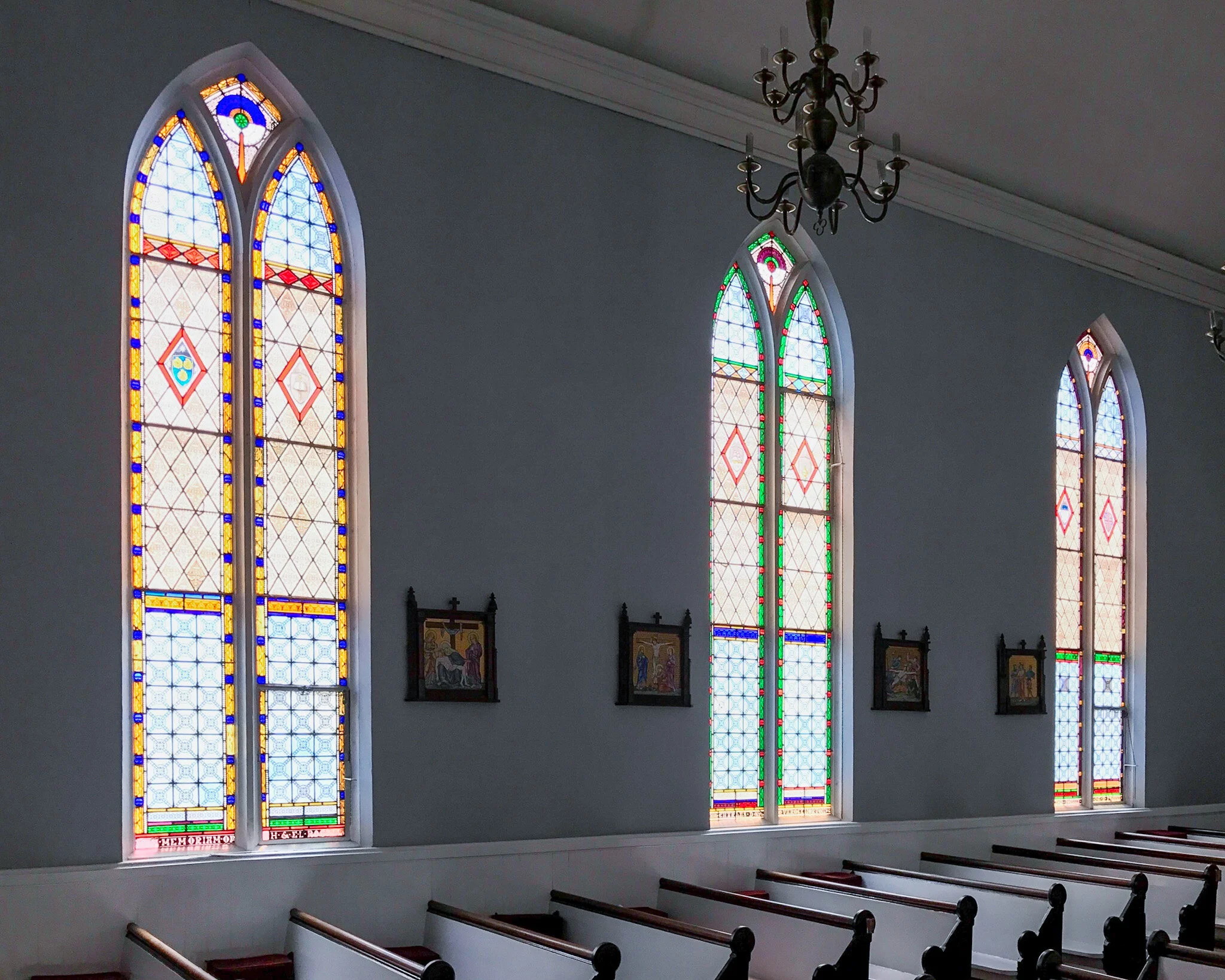This year’s stewardship theme is “For all the Saints.” Since pledge ingathering Sunday is All Saints Sunday this year, we could not resist! Our theme reminds us that what we pledge, what we give, what we do is for all of the saints. It is a powerful message when we unpack it a little.
Who are the saints? This will freak some of you out, because you have told me, “I don’t feel that way!” You are a saint. I am a saint. All of the baptized people of God are saints. This is not liberal inclusion, nor is it therapeutic theology. It is sound Biblical Christianity. All of the baptized people of God are saints.
A Confession for Pride Month
My husband Jim thinks in images, not words. This makes communication at home, uhm, “interesting” sometimes! I can ask a question, receive an answer, and discover Jim meant the exact opposite of the answer given. “Words Matter!” I exclaim. Jim shrugs, and we laugh about it.
As Pride month draws to a close, I, too, need to be reminded that words matter. We have an increasing number of staff, parishioners, and friends of the congregation who use they/them pronouns because their gender is outside the gender binary imposed by society. This has been true of some people throughout human history, and some AfroIndigenous and Asian cultures more readily understand this diversity today than most of us in the West.
Since the age of Aquinas in the 13th century, we have been taught to think that if something is not this, it is that. The reality is sometime something is not this or that, but both, or neither, or something else. Science and lived experience has shown this to be true of human gender, as well.
I Have Another Confession . . .
Two weeks ago I confessed how talking about justice issues can make feel uncomfortable, partly because I do not feel fully equipped, and partly because it can rock the boat. Yet, at times, doing so is compelling, and God always pulls us out of our comfort zones while promising to be with us for the journey.
My confession this week was that I knew nothing about Juneteenth until I was ordained and serving in a parish in Philadelphia. Juneteenth, the June 19th celebration of the freeing of the last enslaved people in 1865, is a major festival in Philly and elsewhere. However, I grew up in South Carolina. Juneteenth was never mentioned, even in school history classes. While we were never fed any garbage trying to excuse slavery or minimize its impact, we never explored the experience of slavery from the viewpoint of an enslaved person or their descendants.
Baccalaureate - Well Done!
Another step forward! This Sunday is Baccalaureate Sunday when we celebrate the achievements of our graduating high school students. In a year like no other, Gabriella Chin, Kerry Ann Hohenshilt, Spencer Hurley, and Colin McAulay all completed their senior years. Gabby and Colin will speak, Spencer will acolyte, and Kerry Ann will usher. Then, we will gather outside for a fellowship celebration with single serving food options following diocesan and CDC guidelines.
That is what we do at St. Peter’s - we move forward in answer to God’s call in whatever way circumstances at the time permit. Our youth have been a sign of that commitment.
I Have a Confession
Our faith practice focus in June is Mercy and Justice. Of all of our faith practices, this is the one is likely to make us the most uncomfortable. My confession is that I share this discomfort, even as my heart holds dear how critical these practices are.
I think we’re OK with mercy, but the Justice part is hard. We get caught up in the confusion of Justice with social agendas, political platforms, and such. I find very helpful this description of Mercy and Justice that Anne Delgado posted on our website:
Justice and mercy often go hand in hand in Scripture. When we experience mercy, we can receive or offer compassion and love regardless of merit. Biblical justice encourages us to go a step further and live selflessly to restore justice or fairness to those who are unrightfully hurt or wronged. Together, mercy and justice help us establish ourselves and our neighbors in right relationship with God.
Lord, make Instruments of your Peace
On November 3, voting in the 2020 elections will conclude and we will soon thereafter know who our next elected leaders are. This has been a very fraught time for our nation and for each one of us, and Election Day is not guaranteed to settle it.
From pandemic, to violence, to racial injustice, to economic, housing, and food insecurity, to manipulative disinformation for the purpose of division, we are beset on every side.
Every aspect of our lives has been disrupted and each of us has been thrust into a more vulnerable space that can emotionally and physically exhaust us. We are facing choices in this election that many of us, regardless of party or candidate we support, see as existential in nature. More than once we have likely heard, “Nobody is at their best right now.”
In the midst of all of this we have a calling as God’s people to be, in the words of the Prayer of St. Francis, “Instruments of [God’s] peace.”
A Son, a Mother, a Prayer
Many people know Augustine through his book, Confessions, in which he tells the story of his life. Looking back, we may see an old, dry, scholarly saint of little interest. However, in today’s world of social media, his life would keep people enthralled. He famously prayed, “O God, save me, but not yet,” because he was not ready to let go of the things he though gave him pleasure. His theology also was not a cerebral exercise, but a working out of how God was at work amid the challenges and instabilities of a world faced with plague, war, and division.
His mother, Monnica (also a saint), was a Christian who loved him and taught him the Christian faith. His father was a Roman official and a pagan. Eventually, the Holy Spirit brought the seeds Monica planted in her son to full blossom and Augustine’s life was transformed. After he surrendered to Christianity, he was baptized by Ambrose, Bishop of Milan, his mentor, and also a saint! He then used his scholarly training and great intellect for the teaching of the Gospel.
His writings endure to this day
Things Present and Things Past
During this time of Pandemic, when every week seems to present a need to figure out a new way of doing things, I have discovered anew one of my favorite prayers from Morning Prayer - A Collect for Guidance:
Heavenly Father, in you we live and move and have our
being: We humbly pray you so to guide and govern us by
your Holy Spirit, that in all the cares and occupations of our
life we may not forget you, but may remember that we are
ever walking in your sight; through Jesus Christ our Lord.
Amen.
While this prayer appears for the first time in the 1979 Book of Common Prayer (p. 100), it actually comes from a collection of prayers published in 1913, which attributes it to an "ancient collect" from 446 AD. So, it is truly something old and something new.
Joseph of Arimathea: Practicing Generous Compassion
Joseph of Arimathea is a quiet favorite of mine among the calendar of saints. His feast day is August 1 for us, and he is remembered on July 31 by the Orthodox and Lutherans and August 30 by Roman Catholics.
We know little about Joseph from the Gospels other than that he was a “secret follower” of Jesus and a dissenting member of the religious council that condemned Jesus. After Jesus’ death, all four gospels tell us that he took the body of Jesus to bury in a tomb, most likely his own tomb that he had prepared for himself.
The first thing that captures me is Joseph’s act of compassion in providing a dignified burial for a man condemned and executed as a traitor and blasphemer.
Peace be With You - In ASL!
As we prepare to regather, one of the changes in our liturgy is that we will not be able to exchange the peace by hugging or shaking hands. We still need to maintain physical distance for everyone's safety. It's an odd truth that the loving and peaceful gesture is to actually stand back! However, exchanging the peace is a very important part of our liturgy, and we can do so in a holy, reverent, and meaningful way.











